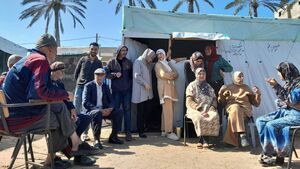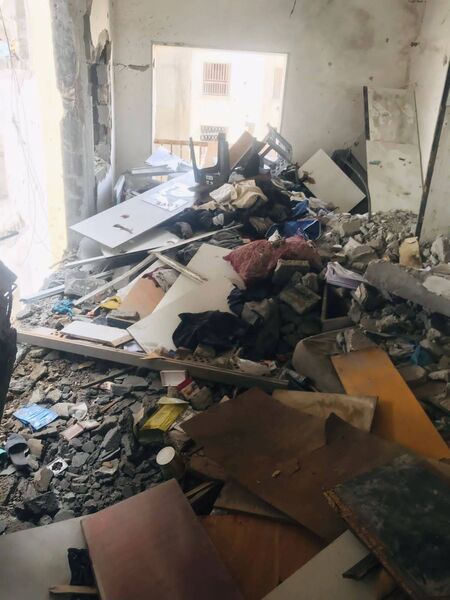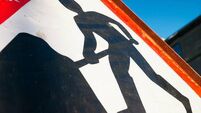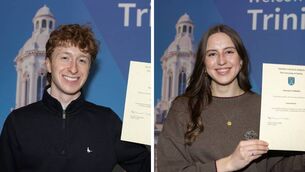'Peace, that's what we need, peace...'

Salma's extended family now share a tent in south Gaza.
Salma Alsharqawi lives in one room in Hotel Westport with her always-smiling toddler son, Sayed, her preternaturally smart daughter, Salwa, who will be four this summer, and her husband, Ziiad, a tall, silver-haired paediatric surgeon.
It’s a squeeze, and there are no cooking facilities, but she is grateful because “we are safe here” – unlike the rest of her family, who are living in a tent in southern Gaza.
Her cousin phones as often as he can – finding a signal involves walking a long way, maybe once a week – to say “hello, we are still alive”, but Salma carries a permanent weight of fear and grief.
It’s been quite a journey to Ireland. Her husband, who is also from Gaza, did his medical degree in Ukraine and stayed in Kyiv to practice medicine, becoming a Ukrainian citizen. His family in Gaza were friends and neighbours with Salma’s family, and on a return visit, the two of them met, fell in love and married. Salma had a good job in pensions, but she left to join him in Kyiv in 2018; from there, she returned home to her family for the births of both her children. She really missed her family.
The first time she came home, pregnant with her daughter, was in 2020; on that occasion, Covid-19 hit, which kept her away from Ziiad for ten months. The second was in 2022. This time, the Russians invaded Ukraine and by the time Sayed was born, Ziiad was a refugee in Ireland.
He came to fetch Salma and the children in early 2023, via Egypt. It is always a long process getting out of Gaza – the Gazan authorities have to be informed, and they inform the Egyptian authorities, and you go on a list which can take “forever” – but the couple and their children made it to Ireland, reunited. Their hope was that the Ukrainian war would soon end, and they could return to Kyiv. But the war dragged on and on… They decided they would return to Gaza, and set up a medical clinic. But before they could leave, there came the war in Gaza.
Salma’s apartment was in the same area of Gaza City as all the rest of her family’s homes. In Salma’s absence, Ziiad’s sister was living in it. Three days after the war began, Ziiad’s sister heard a commotion and looked over the balcony to see everyone running from the building.
“What’s happened?” she called to a neighbour, feeling alone and afraid.
The neighbour shouted, “We have a call from Israel, they’re going to bomb this building!”
So Ziiad’s sister grabbed her handbag, which had nothing in it but some medicine and ID documents, and ran out. Straight away, the apartment block came down behind her.
Every home belonging to Salma’s family was destroyed.
“It’s not just the buildings,” says Salma. “It’s all the old memories, all the things we had, the new furniture I had bought. All of this is gone. Only a few pictures in our phones are left.”
For a while, the whole family kept moving from house to house – one of the brother’s apartments, then to another sister, then an uncle – until the war “became hot” and they fled Gaza City for Khan Younis. There the United Nations Relief and Works Agency (UNRWA) supplied them with tents, and they lived in a compound for three months until Israeli tanks surrounded it, firing shots and shouting at all the people they had to move. Again, too little time. They managed to collect some of their possessions, but a lot was left behind.
There was no transport. They walked. Her parents were in their mid-seventies. Her father was a fit man, a civil servant turned poet, but her mother had high blood pressure and diabetes and found it hard to walk unaided.
One brother works for Doctors Without Borders – he is the only member of the family still to have a job. Everyone relies on him – and he found them a place to stay in a building the organisation kept for its workers. Forty people were in there when it was demolished by an Israeli bomb; two died, over ten were injured – one of them, Salma’s mother, Yousra, was buried under the rubble, shrapnel in her shoulder and chest, her foot pouring blood.
After hours with no ambulance or medical assistance, they managed to get her to a field hospital in Rafah – a tent – and then through the Rafah crossing into Egypt, where she is now in hospital in Cairo. This was about a month ago, and she is still deaf from the sound of the bomb.

It is getting harder and harder to get out of Gaza. Once it just took a long time, but now it costs a lot of money – 5,000 to 10,000 US dollars. The price of escape.
All of her family want to get out – “they dream of a future free from fear, where they can live in peace and rebuild their lives.” One cousin has already been killed when the school she was sheltering in was destroyed. There was a brief warning, she ran, but “the bombs came too quickly”. An uncle has died, lacking the right medicine, refusing to eat – whether from despair or physical inability, Salma doesn’t know.
Now there is no money left to buy their way out.
“All the money they have saved all their lives is gone, it is spent in Gaza because the prices are very, very, very high – an egg is a dollar, a kilo of sugar, six dollars.”
That’s if food can be got at all. Her father has lost 15 kilos; her brothers the same.
“They have become very old, all of them.”
At least, for now, they are still alive; there is a small amount of canned food. The drinking water is of bad quality, and to wash anything, they boil the water from the sea. Her younger brother travelled to Egypt with her mother, and the first thing he did there was to have a very, very long shower.
“I am very happy in this shower,” he rang her to tell her, “after no shower for four months.”
Salma feels her family’s only hope of survival is for her to send them enough money to get out through Rafah. She and Ziiad already send as much as they can, but it is not enough. A new friend in Westport – “everyone in Ireland is lovely, so nice” – has helped her create a GoFundMe page, which has already raised €800, but so much more is needed, to get the right documentation, pay for transport, have food for the journey to Cairo, then buy flights to go on from Cairo – to wherever Salma’s family can live in peace.
“I hope perhaps to bring them to Ireland,” she says. “Or if the war ends in the Ukraine, we have a house in Kyiv. It is still standing, at least until now. Peace, that’s what we need, peace... If I can have a home, and my family around me, everything will be okay.”
It is Ramadan at the moment; the month-long Muslim festival.
“Always, I and my family would sit together at one long table at the start of Ramadan,” says Salma. “This year I tried to make something here in the hotel, for anyone who was Muslim, so we could feel as a family. Next Ramadan I hope that I and my own family will all be together, wherever in the world we are… Because when you are with your family, this is home.”
Please give to Salma's fundraiser on GoFundMe.





